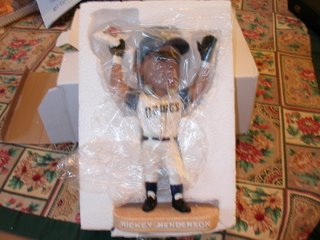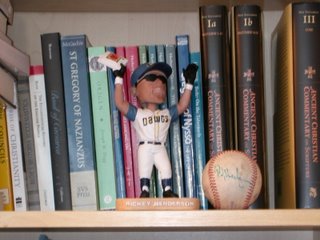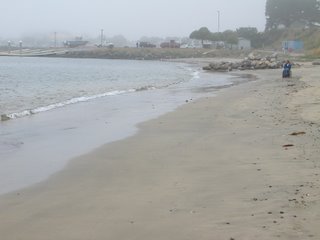I know some of you are familiar with
Oliver O'Donovan, especially those of you who were able to hear him speak in Winnipeg at St. Margaret's a while back, where he preached
this sermon and lectured on topics similar to what he wrote in
this book.
If you are not familiar with the Rev. Dr. O'Donovan, let me commend him highly. I imagine some of you may bristle at his evangelical assumptions and conclusions. However, to my mind, he is a theologian always able to say something
interesting. And with the debates about human sexuality being so stuck and stale, something interesting about human sexuality is very welcome.
So if you're able to take some time and slog through
the first of O'Donovan's "Web Sermons" over at
fulcrum, it is worth the time. (He may be interesting, but he is learned - his prose is characteristically dense in this piece.) What piqued me was the following, at the end of his short summary of liberalism in Christianity:
" . . . There were some very good stories of emancipation to be told, testimonies to the liberating implications of the Gospel and the pastoral involvement of the church, the enormously influential struggle for civil rights in the USA, for instance, and the Latin American base ecclesial communities that gave new energy to Catholic witness in the face of poverty and economic injustice. These threw a lifeline to a floundering liberal imagination, offering a matrix by which the present could be presented as standing in perpetual judgment on the past, allowing the Western hegemonic tradition of modernity to re-brand its anti-conservative appeal . . . In grasping the lifeline, however, Western liberalism paid its price. From that point on, it became identified with one kind of moral cause to the exclusion of others. It became a church-party proper, a specific agenda to pit against other agendas.
. . . The gay cause is grist for the liberal mill while it is in militant mode, for the mill processes victim-classes in want of a fair deal. But Proudhon's "Justice, nothing but justice!" is as restrictive on one front as it is empowering on the other. It allows not the slightest observation on the aesthetic or emotional timbre of gay existence. To demand justice is to make this class like every other class, for justice is thought's weapon against arbitrariness. But when gay experience starts attracting interest and interrogation in its own right and for its own sake, its usefulness to the liberal project is at an end. For that raises questions that were supposed to have been settled long ago; it draws attention to the fragmentation of the modern moral world, and therefore to its insufficiency as a measure to judge the performance of the church.
Gays also pose existential questions. They interest themselves in the riddle of gay existence. Anexetastos bios abiôtos, said Socrates; the life that is unexamined is intolerable to live. And much of the gay Angst is to do with the difficulty of raising questions in public that seem overwhelmingly pressing when they directly concern oneself. The pastoral challenge that the gay phenomenon presents to the church, then, is not primarily emancipatory, but hermeneutic. And that is the supreme justification for a conciliar process that will take up the experience of homosexual Christians as its leading question. How is this form of feeling to be understood? What are the patterns of life with which it may appropriately clothe itself? As far as I can tell, it is deeply in the interest of gay Christians, men and women, that their experience - by which is meant not merely sexual experience, not merely emotional experience, and not merely the narrative of experience, but the whole storehouse of what they have felt and thought about their lives, should become a matter of wider reflection, reflected on by those who are called to live this experience, by those who are called to accompany them in their living, by all who share their understanding of living as something they owe an account of to God."
This is refreshing to me. Evangelical Anglican Oliver O'Donovan is saying that the floundering Liberal paradigm, through it's attraction to oppressed classes to which it can come to the rescue, has
prevented the full expression of the experience of being gay. O'Donovan even calls for that fuller experience to be expressed and heard, and he wants to hear it.
I'll admit to being in very new territory. I'm not sure at all what "gay consciousness," "gay existence," or "gay experience" really is, though I have learned, on a social scale, to think in simple terms of "opressed classes." (The personal scale is very different and probably a little more complete.) I've lived in Berkeley for four years, at a liberal seminary, and I'm newly curious.
What would it mean to think of this experience as "hermeneutic"? What new conversations might happen if we thought this way? What new learning might take place?
To those more familiar with what O'Donovan is referring to, is he making any sense?
Labels: Anglican Communion, Oliver O'Donovan








